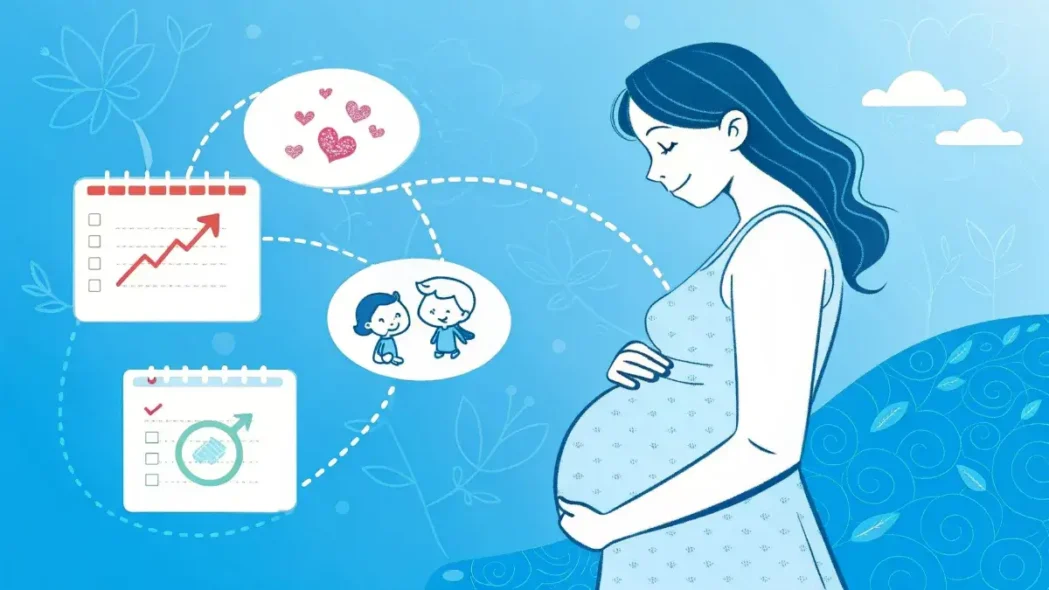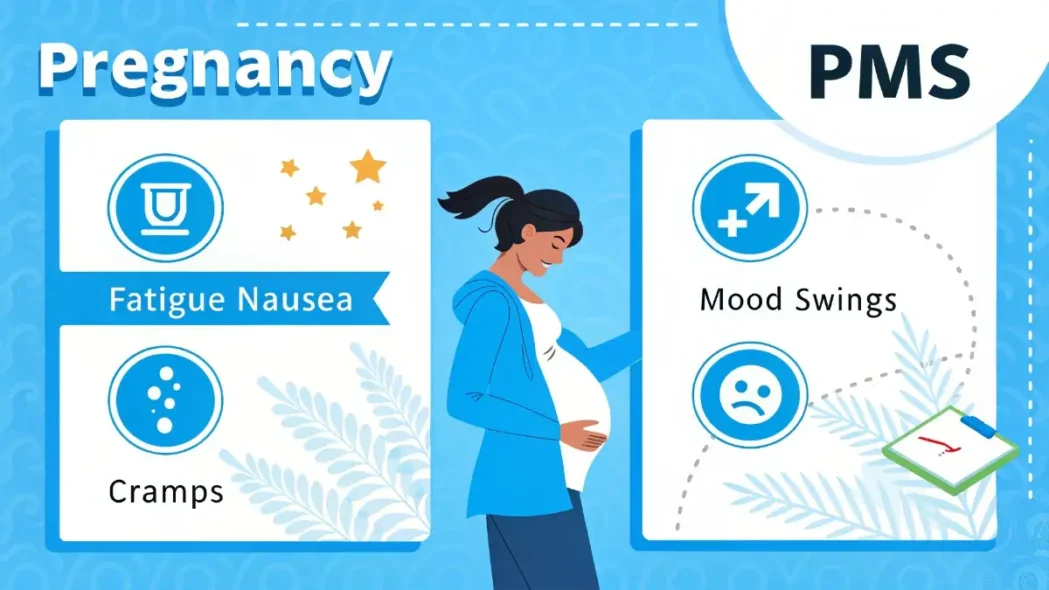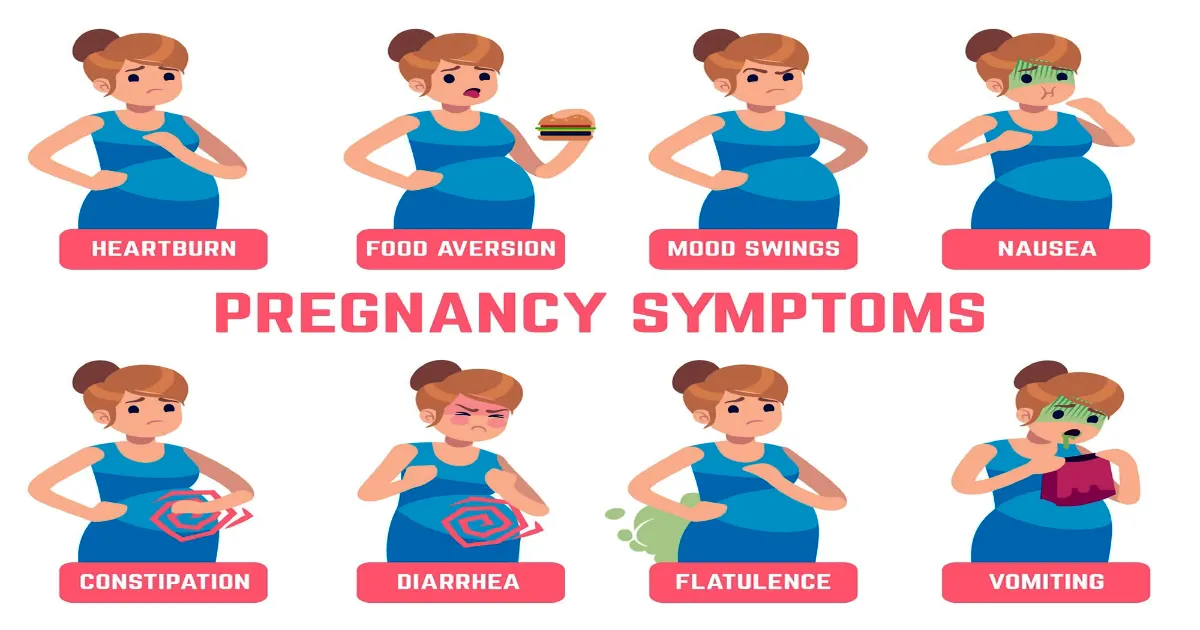Welcome to the exciting and sometimes nerve-wracking journey of possibly becoming a parent! Whether you’ve been hoping for this moment or it’s a wonderful surprise, the first few weeks of pregnancy can be a time of intense curiosity and anticipation. You might be wondering, “Am I pregnant?” or “Are these early signs of pregnancy real?” It’s true that your body starts making amazing changes right away, but catching those early signs of pregnancy just one week after conception can be tricky.
This article will help you understand what to look for, how your body changes, and the steps to take afterward. We’ll explore the subtle clues your body might give you, even before a positive pregnancy test!
Key Takeaways
- Early signs are subtle: Just one week after conception, symptoms are often very mild and can be easily confused with your regular menstrual cycle.
- Hormones are the primary cause: Most early signs of pregnancy are attributed to a surge in hormones, such as progesterone and hCG (human chorionic gonadotropin).
- Implantation is key: Light spotting or cramping might occur when the fertilized egg settles into the uterus, usually 6-12 days after conception.
- Not everyone experiences symptoms: Some people exhibit many early signs, while others feel none at all during the first week.
- Confirm with a test: The most reliable way to know if you’re pregnant is a home pregnancy test or a blood test from your doctor, usually after a missed period.
Understanding Your Cycle: The Foundation of Early Pregnancy Signs
Before we delve into the early signs of pregnancy, it’s helpful to understand how your body works each month. Your menstrual cycle is a finely tuned process that prepares your body for a possible pregnancy.
- Day 1: Your period starts (this is the first day of your cycle).
- Around Day 14 (for a 28-day cycle): Ovulation happens! An egg is released from your ovary. This egg lives for about 12-24 hours.
- Conception: If sperm meets and fertilizes the egg, conception happens. This usually takes place in the fallopian tube.
- Journey to the Uterus: The fertilized egg (now called a zygote, then a blastocyst) travels down to your uterus. This journey takes about 3-5 days.
- Implantation: The blastocyst attaches itself to the lining of your uterus. This usually happens 6-12 days after conception. This is a crucial step for a healthy pregnancy to continue.
The “two-week wait” refers to the period between ovulation and when you can take a pregnancy test. It’s often a time filled with anticipation, worry, and symptom spotting! During this period, especially in that first week after conception, your body is already starting to change, even if you don’t feel much yet.
“The first week after conception is a time of incredible microscopic activity within your body, even if you’re not feeling much on the outside.”
The Very Early Signs of Pregnancy (1 Week Post-Conception)

It’s essential to remember that most of these early signs of pregnancy are subtle and can vary from person to person. They can also be similar to symptoms you might feel before your period (PMS). So, don’t worry if you don’t feel all of them, or if you feel some but aren’t pregnant.
Implantation Bleeding & Cramping: A First Clue?
One of the earliest possible signs of pregnancy that can happen around one week after conception is implantation bleeding and cramping.
- What it is: When the fertilized egg burrows into the rich lining of your uterus, it can sometimes cause a little bit of spotting or light bleeding.
- When it happens: This typically occurs 6 to 12 days after conception. So, if you conceived a week ago, it might be happening now!
- What it looks like: Implantation bleeding is usually much lighter than a regular period. It might be light pink, brown, or a very light red. It’s often just a few drops or a smudge, not enough to fill a pad or tampon.
- Cramping: You may also experience mild cramping that’s less intense than your typical period cramps. It could be a dull ache or slight twinges.
It’s easy to confuse implantation bleeding with the start of your period. Here’s a quick comparison:
| Feature | Implantation Bleeding | Period |
|---|---|---|
| Color | Light pink, brown, or light red | Bright red, dark red |
| Flow | Very light spotting, a few drops, not continuous | Moderate to heavy, continuous flow |
| Duration | A few hours to 1-2 days | 3-7 days |
| Cramping | Mild, dull aches, twinges | Moderate to severe, consistent cramping |
| Timing | 6-12 days after conception (before expected period) | 6-12 days after conception (before the expected period) |
Unusual Fatigue: More Than Just Tiredness
Feeling unusually tired or completely drained? This is one of the most common and earliest symptoms of early pregnancy.
- Why it happens: Your body is working incredibly hard right from the start! Your metabolism is speeding up, and there’s a big increase in the hormone progesterone. Progesterone has a sleep-inducing effect, making you feel extra sleepy.
- What to expect: You might feel like you need more naps, or you’re tired even after a whole night’s sleep. This isn’t just regular tiredness; it’s a deep fatigue that can hit you unexpectedly.
Tender, Swollen Breasts: Hormonal Changes at Play
Your breasts can be one of the first parts of your body to signal early pregnancy.
- Why it happens: Hormones like estrogen and progesterone are surging to prepare your milk ducts. This causes increased blood flow to your breasts.
- What to expect: Your breasts might feel:
- Sore or tender to the touch
- Swollen or heavier
- Tingling
- Your nipples might become more sensitive or appear darker (areolas).
Increased Urination: Your Kidneys Working Overtime
Find yourself making more frequent trips to the bathroom, even if you haven’t drunk much? This can be an early sign of pregnancy.
- Why does it happen?
- The pregnancy hormone hCG increases blood flow to your pelvic area and kidneys, making your kidneys process more fluid.
- As your growing uterus puts pressure on your bladder, you may feel the urge to urinate more frequently.
- What to expect: You might notice you need to pee more often than usual, both during the day and sometimes at night.
Nausea & Morning Sickness: Not Just for Mornings
While often associated with later pregnancy, morning sickness can actually begin very early, sometimes even just one week after conception.
- Why it happens: Rising levels of hCG and estrogen are thought to be the culprits. Your body is also adjusting to rapid changes in blood sugar.
- What to expect: You might feel:
- Queasy or a general feeling of an upset stomach
- Actual vomiting (though less common this early)
- Nausea can strike at any time of day, not just in the morning.
- Important note: Not all pregnant women experience morning sickness. If you don’t have it, that’s perfectly normal!
Heightened Sense of Smell & Food Aversions/Cravings
Have everyday smells suddenly become overpowering, or do certain foods make you feel sick?
- Why it happens: Hormonal changes can make your senses more acute.
- What to expect:
- Super-sensitive nose: The smell of coffee, perfume, or even your partner’s deodorant might suddenly seem unbearable.
- Food aversions: Foods you once loved might now make you feel nauseous just thinking about them.
- Metallic taste: Some women report a strange metallic taste in their mouth.
- Cravings: While more common later, some women experience very specific food cravings early on.
Mood Swings: An Emotional Rollercoaster
Feeling like your emotions are all over the place? You’re not alone!
- Why it happens: The rapid rise and fall of hormones, especially estrogen and progesterone, can greatly affect your brain chemistry and mood.
- What to expect: You might find yourself:
- Feeling irritable or easily annoyed
- Crying over small things
- Feeling anxious or overwhelmed
- Experiencing sudden bursts of joy or sadness
- Remember, it’s normal to experience a wide range of emotions. Be kind to yourself!
Other Subtle Early Signs of Pregnancy
Beyond the more common signs, some women notice other minor changes:
- Lightheadedness or Dizziness: Changes in blood volume and blood pressure can cause you to feel a bit dizzy, especially when standing up quickly.
- Bloating: Hormonal changes can slow down digestion, leading to a bloated feeling, similar to what some experience before their period.
- Basal Body Temperature (BBT) Staying High: If you track your BBT, a sustained rise in temperature for more than 18 days after ovulation can be a strong indicator of pregnancy.
Is It Pregnancy or PMS? Understanding the Differences

Many early signs of pregnancy overlap with symptoms of premenstrual syndrome (PMS). This is why it can be so confusing! While no symptom is 100% unique to pregnancy, here are some common differences to help you tell them apart:
| Symptom | PMS | Early Pregnancy Signs (1 Week) |
|---|---|---|
| Breast Changes | Tenderness, soreness (usually eases when period starts). | Milder twinges are often accompanied by light spotting (implantation). |
| Fatigue | Common, but usually mild and related to poor sleep. | More extreme, persistent exhaustion, even after rest. |
| Nausea | More commonly, it can be persistent, often accompanied by food aversions. | Less common; sometimes an upset stomach. |
| Cramping | More pronounced tenderness, swelling, heavier feeling, and darkening nipples. | Common, but usually mild, and related to poor sleep. |
| Bleeding | Usually more intense, comes before or with a period. | It can be more intense, prolonged, and unpredictable. |
| Mood Swings | Light spotting (pink/brown), very brief, often before the expected period. | Full-flow period, bright red, lasting several days. |
| Appetite | Cravings for specific foods (e.g., chocolate). | Common, usually resolves with a period. |
| Urination | No significant change. | Increased frequency. |
If you’re unsure, remember that the most reliable way to confirm is with a pregnancy test.
Confirming Your Pregnancy: What to Do Next
While these early signs of pregnancy can give you clues, they are not definitive. The only way to confirm a pregnancy is through a pregnancy test.

Home Pregnancy Tests
- How they work: Home pregnancy tests detect the presence of human chorionic gonadotropin (hCG) in your urine. This hormone is produced by your body once the fertilized egg implants in your uterus.
- When to take it: Most home pregnancy tests are designed to be accurate on the first day of your missed period. Taking a test too early (like just one week after conception) might give you a false negative because hCG levels might not be high enough yet.
- Tips:
- Read the instructions carefully.
- Use your first morning urine, as it’s the most concentrated and has the highest hCG levels.
- If you get a negative result but still suspect you’re pregnant, wait a few days and retest.
Blood Tests
- How they work: A blood test performed by your doctor can detect hCG earlier and in smaller amounts than a urine test.
- When to take it: Blood tests can sometimes detect pregnancy as early as 6-8 days after ovulation.
- Types:
- Qualitative hCG test: Simply checks if hCG is present (yes/no).
- Quantitative hCG test: Measures the exact amount of hCG in your blood, which helps track the progression of your pregnancy.
When to See a Doctor 👩⚕️
If your home pregnancy test is positive, or if you’re experiencing several early signs of pregnancy and are unsure, it’s a great idea to schedule an appointment with your healthcare provider. They can:
- Confirm your pregnancy with a blood test.
- Discuss your medical history and lifestyle.
- Start you on prenatal vitamins (if you’re not already taking them).
- Provide guidance on prenatal care.
- Please answer any questions you may have about your health and the baby’s development.
What if Your Test is Negative?
A negative test doesn’t always mean you’re not pregnant.
- You might have tested too early: hCG levels might not be high enough yet to be detected by a home test, especially if you’re only one week past conception.
- You might have miscalculated your ovulation: Your period might just be late for other reasons.
- Other causes for symptoms: Many of the early signs of pregnancy can also be caused by stress, illness, changes in diet or exercise, or other hormonal fluctuations.
If your test is negative but you still feel pregnant, wait a few more days (ideally until after your missed period) and retest. If you continue to have symptoms and no period, or if you have concerns, always consult your healthcare provider for guidance.
The Journey Ahead: Embracing Your Pregnancy
If your pregnancy is confirmed, congratulations! This is the beginning of an incredible and transformative journey. Remember to take care of yourself, listen to your body, and don’t hesitate to reach out to your healthcare provider with any questions or concerns.
Learning about your child’s development, like understanding what is autism and what are the early signs of autism, or even parenting strategies like how to encourage honesty in your child or 10 parenting tips to calm down any child in a minute, will become important in the coming years. For now, focus on this amazing new chapter!
🤰 Early Pregnancy Symptom Checker
Select the symptoms you are currently experiencing. This tool provides general guidance and is NOT a substitute for a medical diagnosis or a pregnancy test.
FAQ’s
When do you start to feel pregnant?
Some people start to feel early signs of pregnancy as early as 1-2 weeks after conception (around the time of a missed period), while others don’t feel symptoms until several weeks later, or not at all. It varies significantly from person to person.
Am I pregnant or overthinking?
It’s very common to wonder if your symptoms are real or just in your head, especially because many early signs of pregnancy overlap with PMS. The best way to know for sure is to take a home pregnancy test after your missed period, or get a blood test from your doctor.
Can you tell if you’re 1 week pregnant?
Week pregnant” usually refers to 1 week after your last menstrual period started, meaning you haven’t even ovulated yet. If you mean 1 week after conception, some very subtle early signs of pregnancy, like implantation bleeding or fatigue, might begin, but they are often hard to notice and not reliable for confirming pregnancy. A pregnancy test won’t be accurate at this early stage.
How to tell if pregnant without a test?
You can’t definitively tell if you’re pregnant without a test. While you might notice several early signs of pregnancy like missed period, nausea, tender breasts, or fatigue, these can also be caused by other factors. A pregnancy test (urine or blood) is the only way to confirm.
Conclusion
Detecting early signs of pregnancy just one week after conception can be challenging due to their subtlety and similarity to PMS. However, by paying close attention to changes in your body, such as implantation bleeding, unusual fatigue, tender breasts, increased urination, or even a heightened sense of smell, you may catch the first whispers of a new life. Remember that while these signs can offer clues, the most reliable way to confirm your pregnancy is through a home pregnancy test or a visit to your healthcare provider. Every pregnancy is unique, so listen to your body, be patient, and seek professional advice when needed.



thanks for your guidance and counseling